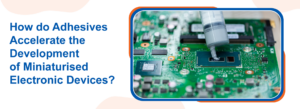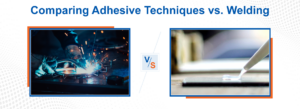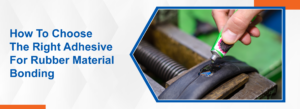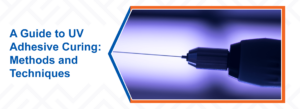How Do Adhesives Help in Medical Diagnostic Equipment?

Medical devices are composed of complex structural elements that demand a reliable bonding solution to ensure consistent performance and precise results. While traditional fasteners, such as screws and mechanical clips, continue to be used in device assembly, the industry is rapidly transitioning to advanced adhesive technologies. This shift is driven by the need to achieve superior mechanical performance, enhanced durability, and compatibility with modern manufacturing processes. Among these adhesives, epoxy solutions have become a preferred choice for their ability to withstand the harsh conditions and rigorous demands of medical environments.
In this blog, we will explore the major benefits and applications of adhesives for medical diagnostic equipment and how they ensure the longevity of medical devices.
A] Applications Of Epoxy Adhesive For Medical Device Manufacturing
1. Bonding And Assembly Of Devices
Medical diagnostic devices, such as ultrasound machines, MRIs, and X-ray systems, require intricate assembly processes that demand high-performance bonding solutions to ensure operational integrity. As the industry trends towards lighter and sleeker designs, many medical device manufacturers are replacing mechanical fasteners with epoxy adhesives. These adhesives are essential for preventing rust and contamination during sterilisation processes. When selecting medical-grade adhesives, it’s crucial to consider factors such as their ability to withstand sterilisation, bonding strength, biocompatibility, and resistance to chemicals. By evaluating these factors, manufacturers can ensure their devices maintain integrity and safety throughout their lifecycle.
2. Coating and Potting Electrical Components
Medical diagnostic equipment, such as ECG machines, MRI scanners, and radiology devices, contains sensitive electrical components like PCBs (Printed Circuit Boards). Epoxy adhesives bond and protect these critical electronic parts. Once assembled, components are coated or potted with specialised epoxy formulations that offer electrical insulation, shielding them from dust, moisture, and chemicals. In some cases, conductive epoxies are employed to ensure seamless current flow within circuits, enhancing device reliability. Additionally, these epoxies protect the circuits from repeated exposure to sterilisation cycles.
3. Optically Clear Adhesives For Laboratory Equipment
Optically clear epoxy adhesives play a crucial role in bonding lenses and screens used in laboratory equipment, delivering exceptional adhesion without compromising optical clarity. These adhesives provide robust resistance to environmental factors, ensuring the equipment’s functionality and longevity. Furthermore, they are specifically designed for sealing microfluidic devices in laboratory diagnostics, facilitating precise, leak-proof channel formation. Our customisable optically clear epoxies can be engineered with non-yellowing properties, effectively maintaining the equipment’s integrity and visual clarity for extended periods.
4. Sealing Delicate Components
Medical diagnostics equipment withstand extreme conditions, such as mechanical shocks and vibrations, which can compromise the integrity of sensitive components. To address these challenges, manufacturers employ advanced medical-grade sealants designed to securely bond critical parts and minimise the risk of failure. These sealants not only enhance structural stability but also offer robust protection against moisture, particulate contamination, and chemical exposure. For bespoke solutions, engage with a specialised medical-grade adhesive manufacturer to ensure that sealants meet precise application specifications.
5. Disposable Diagnostic Devices
Many diagnostic devices are meticulously engineered for single use to mitigate cross-contamination risks and uphold stringent sterility standards. Within this framework, specialised adhesives play a pivotal role in the assembly of disposable devices, including blood glucose monitoring test strips and lateral flow assays for pregnancy testing. Adhesives have several characteristics including rapid curing times, biocompatibility, and robust resistance to moisture and temperature fluctuations to ensure the accuracy and integrity of critical medical applications.
6. Sensor Assembly
Sensors play a crucial role in various diagnostic devices, including glucose monitors, electrocardiograms (ECGs), and blood pressure monitors. The reliability of these devices hinges on effective adhesive bonding, which secures the sensors to their substrates. High-performance adhesives not only ensure the sensors stay firmly in place but also enhance their sensitivity and accuracy, contributing to more reliable readings and improved patient care in medical settings.
Also read: What Are the Different Types of Adhesives & Their Applications?
Have Questions About Finding the Perfect Custom Adhesive?
B] Benefits Of Using Medical Grade Adhesive For Medical Diagnostic Equipment
1. Biocompatibility
Medical-grade epoxy adhesives offer exceptional biocompatibility, making them safe for use in diagnostic equipment that may come into contact with human skin or bodily fluids. These adhesives are rigorously tested according to USP Class VI and ISO 10993-5 standards, which are critical certifications in the medical field. USP Class VI testing ensures that materials do not leach harmful substances, even under prolonged exposure to bodily tissues, while ISO 10993-5 evaluates cytotoxicity to confirm that adhesives are non-toxic to human cells. These certifications are vital because they guarantee that medical-grade adhesives won’t cause irritation, or toxic reactions or interact with blood, ensuring patient safety and device reliability in sensitive applications.
2. Immune To Sterilisation Cycles
Medical devices undergo rigorous sterilisation cycles that often involve harsh chemicals and varying degrees of heat and radiation. The most common sterilisation techniques include autoclave (steam sterilisation), chemical sterilisation (ethylene oxide EtO, peracetic acid, glutaraldehyde, ethanol, isopropyl alcohol and hydrogen peroxide) and radiation sterilisation (gamma rays, ultraviolet, high energy electron beams – E-beam). Epoxies are a superior choice when it comes to resisting numerous cycles of severe medical sterilisation. It is engineered for superior durability which ensures diagnostic instruments and other medical equipment are thoroughly sterilised without compromising their structural integrity or performance. By selecting epoxy adhesives, manufacturers enhance the reliability of medical devices while ensuring compliance with stringent health and safety standards in the healthcare sector.
3. Reliable In High Temperatures
Medical diagnosis devices undergo high temperatures, typically 121°C – 132°C during dry heat and steam autoclave sterilisation to prevent pathogen transfer between patients. To maintain bond strength after these sterilisation processes, manufacturers utilise medical-grade adhesives specifically formulated to endure steam sterilisation. Most devices undergo repeated (few hundred to thousands) steam sterilisation cycles over the life of the device. Medical grade epoxy adhesives ensure reliable performance and safety in critical healthcare settings, allowing devices to maintain their integrity and functionality while effectively resisting harsh sterilisation conditions.
4. Makes Devices Lighter
The medical industry is increasingly focused on creating lighter and smaller diagnostic devices for enhanced portability. Medical-grade epoxy adhesives are ideal for bonding these devices, as they are lighter than metal fasteners. Additionally, epoxy adhesives provide superior bond strength than traditional fasteners, ensuring the structural integrity of medical equipment. The combination of lightweight properties and high-strength bonding makes epoxy a preferred choice in modern medical device assembly.
5. Longevity
Epoxy adhesives enhance resistance to moisture, corrosion, dust, and various environmental factors, significantly extending the lifespan of devices. The durability reassures hospitals and healthcare facilities that their investments in advanced technology will remain functional and reliable, even after years of use. Ultimately, utilising epoxy adhesives contributes to the long-term performance and safety of medical devices in critical healthcare settings.
6. Versatile And Customisable
Epoxy adhesives are renowned for their versatility and customisability, making them ideal for medical diagnostic devices. Manufacturers can select from a diverse array of epoxy formulations tailored to meet specific needs. It includes thermal management, structural bonding, sealing, coating, and encapsulation. This adaptability ensures that medical devices are well-equipped to handle various conditions and applications, providing reliable performance and durability in critical healthcare settings.
7. Resists Harsh Chemicals
Medical diagnostic devices are frequently subjected to aggressive chemical agents during sterilisation and treatment processes, which can lead to the degradation of metallic components and compromise the integrity of internal electronic systems. Employing medical-grade epoxy coatings serves as an effective mitigation strategy. These coatings are specifically formulated to exhibit superior chemical resistance. It safeguards devices against corrosion and ensures optimal performance and longevity in rigorous clinical settings.
Conclusion
Epoxy adhesives are integral to diverse medical applications, serving functions such as bonding, assembly, sealing, and coating of critical components. Medical-grade epoxy adhesives provide distinct advantages over conventional fastening methods, including enhanced structural integrity and biocompatibility. These adhesives can be precisely formulated to meet specific performance criteria, such as electrical conductivity, thermal stability, and optical transparency. For specialised medical-grade epoxy solutions, consult our experts at Kohesi Bond to identify the optimal adhesive for your specific industrial requirements.
Have Questions About Finding the Perfect Custom Adhesive?
FAQs
Adhesives are used for bonding, sealing, and coatings of various components in medical diagnostic equipment.
Adhesives provide sleek, lightweight bonding solutions that do not protrude like screws or rivets, ensuring a more ergonomic design.
Yes, medical-grade adhesives are designed to withstand harsh environmental conditions like extreme heat, chemicals, and moisture. You can also customise the epoxy according to your specific needs to have unique resistances.
Medical adhesives are used to keep the devices secure under any condition, leading to improvements in diagnostic equipment. Certain epoxies are also used to keep the crucial components safe under pressure and hazardous conditions, ensuring accurate test results.
At Kohesi Bond, we use all the best industrial practices, compliances, and regulations to ensure each of our products is not just comparable but better than the industry standard. Our products meet stringent industry standards like the USP Class VI and ISO 10993-5 certifications, and biocompatibility tests.
You can contact us through our website to inquire about our medical adhesive products or request samples. Our support staff is always eager to help you find the best products according to your needs.
We at Kohesi Bond are always available to help you find the right medical-grade adhesive for your industrial needs. We also provide customised epoxy adhesives that suit your unique industrial needs.
Further also read:
Adhesive Selection For Space Applications
Applications And Considerations For Automotive Sealing
7 Tips To Choose Epoxy For Optical Applications

Utsav Shah is a 34-year-old entrepreneur with a passion for scientific discovery. Utsav’s journey began with a deep dive into materials science, earning degrees from USC and the Institute of Chemical Technology. He’s the visionary founder of Kohesi Bond, a top-rated adhesive manufacturer, and Cenerge Engineering Solutions, a leader in heat exchangers and cryogenic pumps. With over a decade of experience, Utsav consults across various industries, ensuring they have the perfect adhesive solution for their needs. Connect with him on LinkedIn!
Recent Blogs

How do Adhesives Accelerate the Development of Miniaturised Electronic Devices?

Comparing Adhesive Techniques vs. Welding

How To Choose The Right Adhesive For Rubber Material Bonding


 Online | Privacy policy
Online | Privacy policy